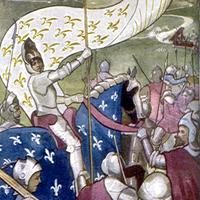33. The New Trade-Route
"Then from ancient gloom emerged The rising world of trade. " —THOMSON. It was some time before the rejoicings subsided which had burst over Portugal on the safe return of Vasco da Gama, who had been laden with every possible honour. All eyes now turned to far-off India, even though the way lay through stormy seas, even though it was a well-known fact that Vasco da Gama had lost his brother and more than half his men in the perilous voyage. The pepper, cloves, cinnamon, ginger, and mace brought back from Calicut had yielded immense profits at home, and men were eager to go and get more.
So the king fitted out another expedition, and gave the command of it to Pedro Cabral, with whom Bartholomew Diaz, the original discoverer of the Cape, was to sail. Thirteen ships were well supplied and manned. Monks were to sail with the fleet in order to teach Christianity to the native Indians, while 1200 picked soldiers went in case of trouble.
The fleet sailed from Lisbon on March 9, 1500. Cabral guided his ships past the Cape Verde Islands safely, and then for some reason, perhaps driven by stormy weather, he took a westerly course that he knew. On and on he sailed, till a month later he found himself on an unknown coast in an unknown land. It was Brazil, in South America. But he named it Santa Cruz, and took formal possession of it in the name of the King of Portugal. Sending a ship home with the news, and some gorgeous paroquets from the country, he then made his way to India.
Two months after he left Lisbon he reached the Cape. As the ships sailed round the southern point they encountered a terrific storm. The waves rolled mountains high, the wind whistled and shrieked, and four ships foundered. Among them was one commanded by Diaz, the man who had revealed the secret of the Cape kept through so many long ages. For him it was indeed a Cape of Storms. With six ships only, Cabral pushed on to Mozambique, and thence to Calicut. He entered into a commercial treaty with the Indians, but treachery was at work and a number of Portuguese were massacred.
Cabral returned to Lisbon with only three ships out of the thirteen that started, for he lost one on the reefs near Melinda, laden with spices from India.
"Sire, my inclination prompts me to make another voyage," said Vasco da Gama one day after the return of Cabral, whose doubtful fortune had disappointed the king. "Wherefore I entreat your Highness to allow it for your service. " The king was delighted, and Vasco da Gama was soon afloat again with thirteen ships, ten of which were ships of war, for this was to be an expedition of revenge on the King of Calicut for his double dealing with the Portuguese.
"I feel in my heart a great wish to go and make havoc of the King of Calicut, so that I may take vengeance on him, and that your Highness may be much pleased," were among Gama's last words to his Christian sovereign. It was a sorry way to carry the message of peace to the natives of India.
With banners and standards, and crosses of Christ on every sail, the ships started on March 25, 1502. They had a tremendous storm while rounding the Cape, which separated the fleet, but all save one turned up at Mozambique. It was August before they reached Melinda, where the king received Gama as an old friend, and loaded him with presents. Sailing on to India, the Portuguese commander took a horrible revenge on the Indian traders, whom he wished to impress with the power and the majesty of the great Christian monarch whom he served.
He ordered that some eight hundred merchants, captured in peaceful commerce, should have their hands, ears, and noses cut off, their feet tied together, and be placed in heaps on board ship, covered over with dry mats and leaves. Then the ship was set on fire with her sails set, and so drifted to shore.
No wonder the King of Calicut prepared a fleet to sail against this cruel Portuguese commander. But he was no match for well-equipped ships from the West. More revenge and cruelty followed, until in the end Vasco da Gama terrified the merchants into submission, left a Portuguese colony on the Indian coast, and sailed for home with ten ships laden with wealth from India.
Great were the king's rejoicings when he saw Vasco da Gama again. "You shall be Admiral of the Indian Seas for ever," he cried. Some years later Vasco da Gama went out to India again, and there he died, far away in the country he had discovered for Portugal.
He had rendered great services to his king and to the whole world, but the glory of his fame will ever be stained by the remembrance of his cruel oppression of the traders on the western coast.

